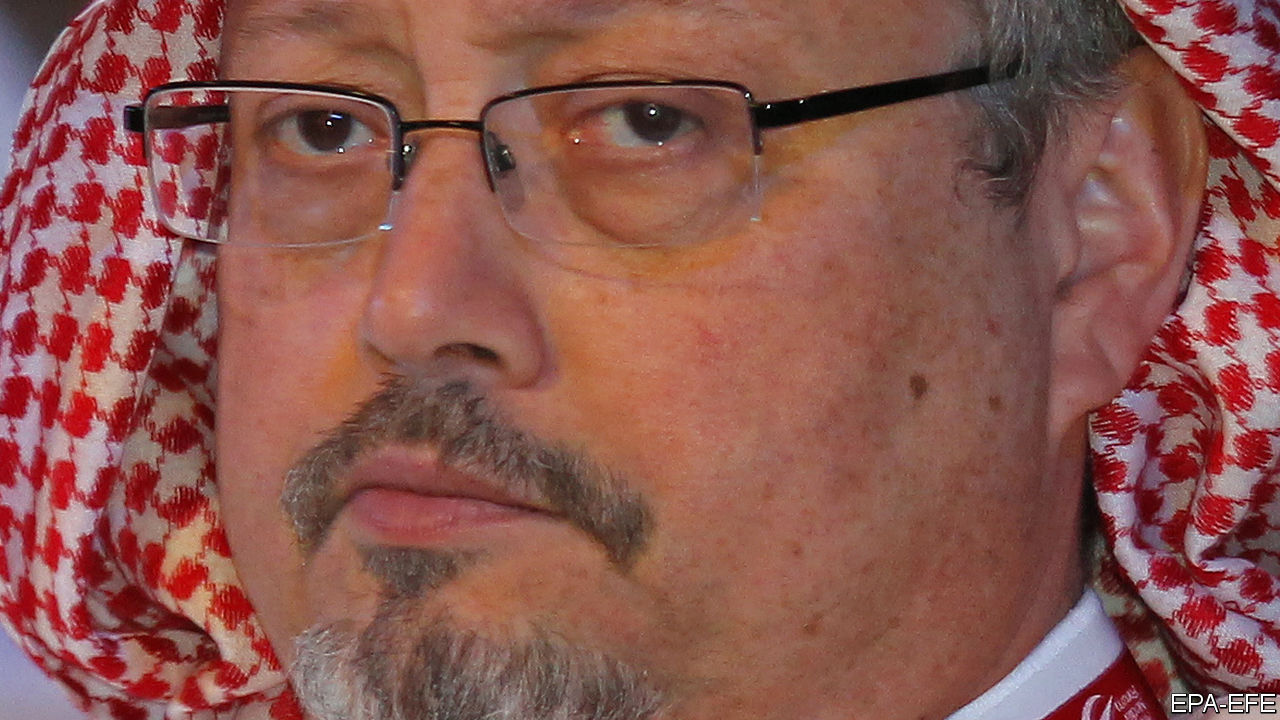
SAUDI ARABIA has finally admitted what much of the world has known for weeks: Jamal Khashoggi is dead. A critical journalist in self-imposed exile, Mr Khashoggi walked into the Saudi consulate in Istanbul earlier this month and was not seen again. The Saudis insisted he left safely and impugned anyone who said otherwise—until October 19th, when the kingdom finally admitted his death in a late-night statement. But it was not murder, or even an attempted abduction gone bad, the Saudis claimed. Instead they spun it as a sort of diplomatic bar fight. Mr Khashoggi had a “discussion” with unnamed men inside the consulate, which “led to a brawl” and ultimately his death.
After so much dissembling, anything the Saudis say should be treated with deep suspicion. This cover story, which they had two and a half weeks to prepare, is brazen in its absurdity. It requires believing that a 59-year-old went to get paperwork for his upcoming wedding and picked a fight with a large group of men. It does not explain why those men were inside the consulate in the first place. Turkish investigators have released the names and photos of 15 Saudis flown to Istanbul on private jets hours before Mr Khashoggi entered the mission. They included spies, special-forces officers and a coroner. This was a remarkably well-organised accident. The official statement also ignores a final, macabre question: the fate of Mr Khashoggi’s body.
Eighteen Saudis have been arrested, and five senior officials sacked. One was Ahmed al-Assiri, a deputy intelligence chief rumoured for days to be a possible scapegoat. More significant is the sacking of Saud al-Qahtani, the belligerent media adviser to the powerful crown prince, Muhammad bin Salman. Little known outside the region, Mr Qahtani looms large in the Gulf, using social media to launch acerbic attacks on critics. He kept a blacklist of troublesome journalists and marshalled an electronic army of Twitter trolls that Saudi dissidents dubbed “the flies”.
Both men are close to Prince Muhammad. They are not known as freelancers. “I am an employee and a faithful executor of the orders of the king and the crown prince,” Mr Qahtani tweeted last year. Saudi officials insist that Prince Muhammad knew nothing about the plot against Mr Khashoggi. Either they are lying or Prince Muhammad has no control over his closest aides. Neither scenario is reassuring. Yet it looks as if the plan is for the crown prince to escape any blame for what happened in Istanbul. Alongside the sackings, King Salman appointed a committee of ministers to overhaul the Saudi intelligence apparatus. It will be chaired by Prince Muhammad.
Saudi Arabia’s immediate goal is to ensure that this episode does not ruin its relationship with President Donald Trump, who seems willing to accept the cover story. He called the Saudi investigation credible and “a very important first step”. He also warned lawmakers not to impose sanctions on Saudi Arabia by cutting off arms deals. But both Democrats and Republicans continue to criticise the kingdom. “To say that I am sceptical of the new Saudi narrative about Mr Khashoggi is an understatement,” said Lindsey Graham, a Republican senator and Trump ally. Earlier in the week Mr Graham called for Prince Muhammad’s removal.
The kingdom may have clout in Washington, but it is not Israel, a country with a deep reservoir of popular support. A recent survey by The Economist and YouGov, a pollster, found that just 4% of Americans view Saudi Arabia as an ally. Lawmakers have already called for sanctions on Saudi officials found culpable in the murder. Republicans will not suffer politically for bucking the president on this issue.
Turkey has played an astute game, leaking details to the media but withholding the most damning evidence it claims to possess: audio and video recordings of Mr Khashoggi’s murder. If it released the tapes, or even played them for a select audience, the subsequent outrage would be hard for Mr Trump to ignore. The Turkish president, Recep Tayyip Erdogan, may wish to trade his trump card for Saudi investment—or use it to undermine the Saudis’ position in the region.
Prince Muhammad is 33 and hopes to rule for decades. Despite other ruinous policies, such as the war in Yemen and the blockade of Qatar, he built a reputation as a forward-looking reformer. Mr Khashoggi’s death seems to have shattered that image. Instead his defenders are falling back on a more traditional defence. “The wider region is on a knife’s edge,” says Ali Shihabi of the Arabia Foundation, a pro-Saudi think-tank in Washington, DC. “It would be insane to do anything that puts such stability at risk.” Generations of Arab autocrats used that argument to persuade the West to overlook their abuses. In the end, all of them left the region less stable than they found it.








